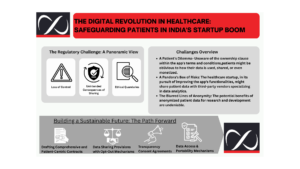
The Indian healthcare startup landscape is a vibrant tapestry of innovation. Telemedicine consultations, AI-powered diagnostics, and disease management apps are weaving a future of improved access, affordability, and personalized care for millions. However, a single, entangled thread threatens to unravel this progress: the murky issue of data ownership and sharing. The lack of clear contractual agreements regarding patient data creates a legal minefield for startups, raises ethical concerns about patient privacy, and hinders the potential benefits of data-driven healthcare solutions.
A Patient’s Data Odyssey: Who Holds the Reins?
Imagine a scenario: a patient utilizes a healthcare app that meticulously tracks vitals, dietary habits, and activity patterns.This data becomes a rich tapestry, weaving a narrative of the patient’s health. But a crucial question emerges – who truly owns this narrative?
Is it the patient, who diligently inputs data and entrusts the app with their health story? Or is it the healthcare startup, the weaver who designed the app to collect and analyze this data? Perhaps the ownership lies with a third-party analytics firm,who interprets the data to provide insights and optimize the app’s functionalities.
The absence of clear contractual agreements leaves patients in the dark. This lack of clarity breeds several disquieting scenarios:
- Loss of Control: A Patient’s Dilemma: Unaware of the ownership clause within the app’s terms and conditions,patients might be oblivious to how their data is used, shared, or even monetized. The app might be selling anonymized data packages to pharmaceutical companies, potentially influencing targeted marketing campaigns for medications. Patients, under the impression their data is solely used for their health management, might be unknowingly exposed to such practices, eroding trust in the healthcare startup and the entire telemedicine ecosystem.
- Unintended Consequences of Sharing: A Pandora’s Box of Risks: The healthcare startup, in its pursuit of improving the app’s functionalities, might share patient data with third-party vendors specializing in data analytics.These vendors might further share the data with other entities within their network, each with their own data usage policies. Unclear contracts, lacking limitations on data sharing, could expose patients’ anonymized data to a multitude of actors, potentially jeopardizing their privacy. The possibility of the data being used for unintended purposes, such as targeted advertising by unrelated companies or even insurance discrimination based on anonymized health trends, becomes a looming threat.
- Ethical Quandaries: The Blurred Lines of Anonymity: The potential benefits of anonymized patient data for research and development are undeniable. Analyzing aggregated data sets can unlock crucial insights into disease patterns, treatment efficacy, and personalized medicine approaches. However, the line between anonymized and identifiable data can be surprisingly thin. Unclear contracts might not outline robust data anonymization processes,leaving patients’ data vulnerable to potential re-identification. This raises serious ethical concerns, as re-identified data could be used to breach their privacy, exploit their health conditions, or even lead to discrimination in employment or insurance opportunities.
The Evolving Legal Landscape: A Work in Progress
The Digital Personal Data Protection Act, is a significant stride for data privacy in India, has inadvertently created a set of challenges for startups operating in the healthcare sector. One pressing issue arises from the Act’s ambiguity regarding data ownership within the realm of medical information. Startups are left grappling with uncertainty about whether patients retain exclusive control over their health data or if a shared ownership model exists, complicating the establishment of clear data governance practices.
Additionally, the Act’s lack of explicit guidelines on data sharing practices presents another obstacle for healthcare startups. Without clear directives on the permissible extent of data collaboration with third-party vendors, startups face difficulties in navigating partnerships and collaborations within the healthcare ecosystem. This ambiguity not only hampers the pace of innovation but also discourages startups from engaging in collaborative research and development initiatives that rely on the analysis of patient data.
In essence, while the Digital Personal Data Protection Act marks a significant stride forward in safeguarding data privacy, its silence on healthcare data poses notable challenges for startups. The absence of clarity on data ownership and sharing practices inhibits startups’ ability to develop robust data management frameworks and hinders their participation in collaborative efforts aimed at advancing healthcare innovation.
Building Trust Through Clear Contracts: Weaving a Secure Future
The uncertainty of data ownership and sharing in Indian healthcare startups necessitate proactive legal measures. These measures will ensure transparency, build trust with patients, and navigate the evolving regulatory landscape. Here are some key legal solutions startups can implement:
- Drafting Comprehensive and Patient-Centric Contracts: The foundation of responsible data management lies in meticulously crafted contracts. These contracts should explicitly address data ownership. Will patients retain sole ownership, or will a shared ownership model exist? If opting for shared ownership, clearly define the startup’s limited rights to utilize the data for specific purposes, such as platform improvement or anonymized research, with explicit patient consent.
- Detailed Data Sharing Provisions with Opt-Out Mechanisms: Contracts should not be shrouded in ambiguity regarding data sharing. Outline the specific purposes for which patient data can be shared with third-party vendors. Define clear limitations on further sharing and ensure patients are informed about these practices. Crucially, incorporate opt-out mechanisms, empowering patients to choose whether or not their data is shared with third parties. Additionally, detail the robust security measures the startup and its vendors implement to safeguard patient data throughout its lifecycle.
- Robust Data Anonymization Processes with Independent Verification: Protecting patient privacy goes beyond simply removing names and addresses. Contracts should outline specific protocols for anonymizing patient data, ensuring it remains truly de-identified and minimizes the risk of re-identification. Consider incorporating independent audits and verifications of these anonymization processes to strengthen trust and transparency.
- Transparency and User-Friendly Consent Agreements: Jargon-laden legalese has no place in patient contracts. Contracts should be written in clear, concise language that patients can understand. Avoid complex legal terminology and ensure patients fully grasp the terms of data ownership and sharing before they utilize the service. Patient consent is paramount. Focus on informed consent, ensuring patients are fully aware of how their data will be used and have the unfettered right to withdraw consent at any time.
- Data Access and Portability Mechanisms: Empower patients by giving them control over their health data. Contracts should outline clear mechanisms for patients to access their data stored within the platform. Allow them to download or transfer their data to another healthcare provider or service if they choose. This promotes competition within the healthcare ecosystem and empowers patients to make informed decisions about their healthcare data.
- Establishing Dispute Resolution Mechanisms: Anticipate potential disagreements on data ownership, sharing, or privacy breaches. Contracts should establish clear and efficient dispute resolution processes. Consider internal grievance redressal procedures as a first step, alongside recourse to independent arbitration bodies for more complex disputes.
Conclusion
The legal solutions outlined above are not merely suggestions; they are essential building blocks for a secure and ethical data-driven healthcare ecosystem in India. By prioritizing clear and patient-centric contracts, healthcare startups can navigate the legal complexities of data ownership and sharing. This proactive approach will foster trust with patients, mitigate legal risks, and pave the way for the responsible use of data to revolutionize healthcare delivery in India.









